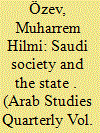|
|
|
Sort Order |
|
|
|
Items / Page
|
|
|
|
|
|
|
| Srl | Item |
| 1 |
ID:
156630


|
|
|
|
|
| Summary/Abstract |
This study focuses on the deconstruction of dominant perceptions of Arab
masculinity, particularly with respect to Hans, the exiled Iraqi protagonist of Diana AbuJaber’s
2003 novel Crescent. Employing the concept of the unheimlich as it intersects with
the Iraqi Al-Futuwwa movement, this article explores the ways in which the condition of
being exiled strips the protagonist of his masculine ideals that are often associated with
nationalism and chivalry, and exposes his internalized vulnerabilities to “unhomeliness,”
since he has been disconnected from country and family. In effect, the study subverts
hegemonic conceptualizations of Arab masculinity by examining the unsettling repercussions
of forced migration.
|
|
|
|
|
|
|
|
|
|
|
|
|
|
|
|
| 2 |
ID:
156629


|
|
|
|
|
| Summary/Abstract |
This article considers religious, social, political, and economic dimensions of the
Saudi-Wahhabi state imagination. Since the inception, the Saudi state has relied on two
main pillars: the monarchy and Wahhabism, which have been in a symbiotic relationship.
In time, the state imagination in Saudi Arabia has been determined and reconstructed
by factors like Wahhabism, monarchism, rentierism, internal and international political
and economic obligations, and modernization efforts imposed by being a “nation state.”
Those factors made Saudi Arabia a sui generis state. The legitimacy of the monarchy has
been ensured through tribalism and, on a larger scale, religion. Foreign aid, booties, oil
revenues, and, on a rather insignificant scale, tax revenues have created a material infrastructure
to build citizenship.
|
|
|
|
|
|
|
|
|
|
|
|
|
|
|
|
| 3 |
ID:
156627


|
|
|
|
|
| Summary/Abstract |
: Youssef Ziedan’s controversial novel Azazeel follows an anonymous narrator’s
journey from Upper Egypt to Aleppo during the first half of the fifth-century AD. This article
argues that descriptions of landscape enable the narrator to articulate personal and
historical crises otherwise censored or repressed. By incorporating geographical features
into his identity, the narrator creates a poetic version of himself free from the hegemony
of the dominant religious discourse. The search for a free, private space shapes the novel’s
aesthetic as well as political concerns. Overall, Azazeel is an important novel because of its
literary value, its denouncement of geopolitical definitions of God, and its ability to place
the history of religious violence in Egypt within the global context
|
|
|
|
|
|
|
|
|
|
|
|
|
|
|
|
| 4 |
ID:
156628


|
|
|
|
|
| Summary/Abstract |
This article argues that the 1991 Gulf War had a deep transformative effect on
Saudi Arabia. It aims to analyze the extent to which this war brought about major ideological
changes to a society seemingly deemed unchangeable. Through the study of three
Saudi novels which drew on this war as a source of creative and political inspiration, this
study brings to life Saudi people’s discussions, dilemmas, and reactions to the crumbling
of the edifice of Arab unity and the emergence of “America” in its place as the “savior”
from the evil of Saddam Hussein. We contend that despite resistance from various conservative
elements of Saudi society, the winds of change brought by this war could not be
resisted. The novels under study skillfully portray the events of this war not as battlefield
accounts, but as accounts of a society wrestling with an irresistible wind of change.
|
|
|
|
|
|
|
|
|
|
|
|
|
|
|
|
|
|
|
|
|